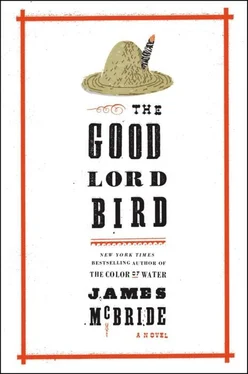The Old Man must’a smelled a rat, for in the middle of his proclamations ’bout immortal souls and the afflicted, his eyes suddenly popped open and he blurted out a quick “Amen.” The crowd hopped out their seats and surged to the front of the hall, making a beeline to commingle with their hero and shake his hand and get his autograph and give him coin donations and so forth.
They swarmed the agent as well, and slowed his progress. But he was still ahead of me, and I was but a colored girl, and the crowd pushed me aside in the scramble to shake the Old Man’s hand. I was being thumped ’bout by Yankees trying to swarm the Old Man. I waved the Good Lord feather again but I was drowned out by taller adults all around. I caught a glimpse of a little girl up front who beat the crowd to the Old Man, holding out a paper for him to sign. He leaned down to sign it, and as he done so, the agent busted through the crowd and made it to the front of the room and was nearly on him. I jumped into the pews and leaped over the seats toward the front.
I was ten feet off when the agent was within arm’s length of the Captain, who had bent down with his back to the agent to put his mark on the paper for the little girl. I crowed out, “Captain! I smell bear!”
The crowd paused a moment, and I do believe the Captain heard me, for his head snapped up and the old, stern, wrinkled face clicked to alertness. He stood and spun around in a snap, his hands on his seven-shooters and I ducked low, for that gun makes a powerful boom when it wakes up. He caught the feller cold. Had the drop on him, for the agent hadn’t quite reached him yet, nor gone for his metal. He was a dead man.
“Aha!” the Old Man said.
Then, to my surprise, his hands came off his seven-shooters and his tight face uncrinkled. He stuck his hand out. “I see you has got my letters.”
The stout feller with a mustache and bow tie stopped short and bowed low in his bowler cap. “Indeed!” he said. He spoke with an English accent. “Hugh Forbes at your service, General. It is an honor to meet the great warrior of slavery of whom I have heard so much. May I shake your hand?”
They shook hands. I reckon this was the “special interest” the Captain had waited on, the thing he had hung around waiting for back east before heading back to the plains.
“I has studied your great war pamphlet, Mr. Forbes,” the Old Man said, “and I daresay it is excellent.”
Forbes bowed low again. “You humble me, dear sir, though I do confess my military training duties are underscored by the many victories I experienced on the European continent under the legions of the great General Garibaldi himself.”
“Indeed it is pertinent,” the Old Man said. “For I has a plan that needs your military training and expertise.” He glanced around at the folks gathered ’round them, then at me. “Let us retire to the back room here, whilst my consort counts up the funds from tonight’s gatherers. There is doings of which I needs to discuss with you in private.”
With that, the two went into the back room of the hall while I collected the funds. What they discussed I weren’t privy to, but they commingled there the better part of three hours, and when they emerged, the hall had cleared out.
It was quiet and the streets was safe. I handed the Old Man the $158 collected from that night’s doings, our best take ever. The Old Man produced another pile of bills, counted them up, placed a total of $600 in a brown bag, just ’bout every penny we’d made from our three months of giving speeches and shows up and down the East Coast, raising money for his army, and handed the bag to Mr. Forbes.
Mr. Forbes took the bag and stuffed it in his vest pocket. “I am proud to serve in the legions of a great man. A general in the score of Toussaint-Louverture, Socrates, and Hippocrates.”
“I’m a captain, serving in the army of the Prince of Peace,” Old Man Brown said.
“Ah, but to me you are a general, sir, and I will call you thus for I serve under nothing less.”
With that, he turned and marched down the alley, military style, like a soldier, clickety-clack, erect and proud.
The Old Man watched him all the way till he reached the end of the alley. “I has been trying to find that man for two years,” he announced. “That is why we lingered here so long, Onion. The Lord finally brung him to me. He will meet us in Iowa and train our men. He is from Europe.”
“He is?”
“Yes indeed. A trained expert under Garibaldi himself. We has a true military trainer, Onion. Now, finally, I am ready to go to war.”
Forbes reached the end of the alley, turned to the Old Man, tipped his cap, bowed, and walked away into the night.
The Old Man never saw him again.
We sat in a flophouse in Chester, Pennsylvania, outside Philadelphia, for two weeks while the Old Man wrote letters, studied maps, and waited for word of the military trainer, Mr. Forbes, arriving in Iowa. When he got a letter from Mr. Kagi saying he hadn’t arrived, he knowed the jig was up. He didn’t mope ’bout it, but rather seen it as a positive sign. “We been had by a wicked snare, Onion. The devil is busy. But the Lord reckons we don’t need training to fight our war. Being on the righteous side of His word is training enough. Besides,” he announced, “my greater plan is ’bout to be unleashed. It is time to hive the queen bees. We is going to Canada.”
“Why, Captain?”
“Is it the white man upon whom the Negro can depend to fight his war, Little Onion? No. It is the Negro himself. We are ’bout to unleash the true gladiators in this hellion against the infernal wickedness. The leaders of the Negro people themselves. Onward.”
I weren’t against it. Being that me and the Old Man traveled as man and consort, the mistress at the flophouse where we stayed made me sleep in the maids’ quarters, a rat-infested sop of a room that reminded me of Kansas. I had gotten spoiled by them Yanks crying over me being a slave and filling me with hasty pudding, smoked turkey, venison, boiled pigeon, lamb, dainty fish, and pumpkin bread every chance they got. The mistress of that tavern weren’t one of those. She didn’t have two cents’ worth of sympathy for no abolitionist, mostly ’cause she was basically a slave herself. She served sour biscuits and gravy, which was fine for herself and the Old Man, for he didn’t have no taste for anything cooked, but my own tastes growed to pumpkin bread, fresh blackberries, turkey, venison, boiled pigeon, lamb, dainty fish, pumpkin bread, and butchered ham with real German sauerkraut like I had up in Boston every time I dropped word on being a slave. I was all for staking out new territory. Besides, Canada was free country. I could stay there and be done with him before he got deadened, which was my thoughts.
We took the train to Detroit, and from there met up with the Old Man’s army, which had growed from nine to twelve. Included in that group was four of the Old Man’s sons: Owen, of course, Salmon, plus two younger ones, Watson and Oliver. Jason and John had quit. A. D. Stevens was still there, grousing, dangerous Yankee that he was. Kagi had commanded them as the Old Man had ordered, and there was some new roughnecks: Charles Tidd, a hot-tempered feller who had served as a soldier with the federals. John Cook was still there, now carrying two six-shooters on his hips, and several others including the Old Man’s sons-in-law, the Thompson boys, and the Coppoc brothers—them last two being shooting Quakers. That was the main ones. With the exception of Cook, who could talk the horns off the devil’s head, they was mostly quiet, serious fellers, men of letters, so to speak. They read newspapers and books, and while they was mellow in polite company, they’d loose their business on you with a muzzle loader and blow a hole in your face in a minute. Them fellers was dangerous, but for the simple reason they had a cause. Ain’t no worse thing in the world than fronting up against one of those, for a man with a cause, right or wrong, has got plenty to prove, and will make you suck sorrow if you get in the way of ’em wrongly.
Читать дальше












